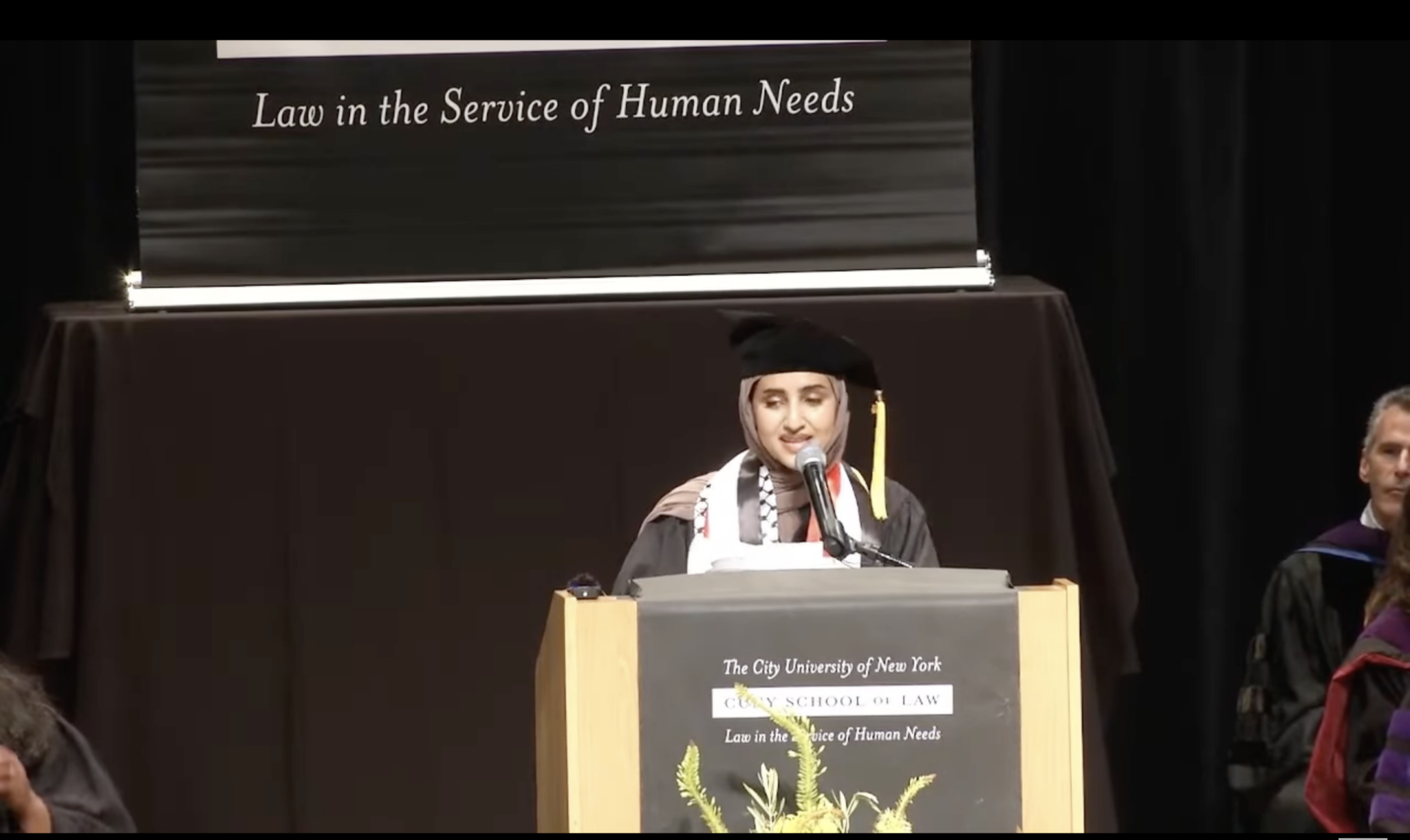After impassioned anti-Israel speech, CUNY Law School reportedly bars student speakers from next commencement
School reportedly received death threats and hate mail after controversy over a student speech denouncing cops and Israel

CUNY Law School graduate Fatima Mohammed’s speech was condemned by CUNY Chancellor Felix Matos Rodríguez and the university system’s board of trustees earlier this year. Courtesy of YouTube screenshot
Months after a student at CUNY Law School’s commencement made a fiery speech criticizing Israel and the New York City police, the school is reportedly planning to exclude student speakers from its 2024 graduation.
A critical New York Post story published two weeks after the May 12 speech prompted politicians and pro-Israel activists to condemn the speaker’s words as hateful and antisemitic. The school was inundated with hate mail, donors threatened to withhold support, and security was increased after death threats were made against staff, according to a student account of a meeting where fallout from the controversy was described.
Several students said excluding student speakers from next year’s commencement would constrain free speech, while a Jewish activist said the decision doesn’t go far enough.
The faculty meeting
Notes from a Sept. 13 faculty meeting attended by two students reported that the 2024 commencement would not have a student speaker.
Official minutes of the meeting provided by the school to the Forward said only that the 2024 commencement would “be shorter and focused on making all in attendance feel welcome.”
Neither the law school’s dean, Sudha Setty, nor law school spokesperson Elise Billing responded to a request for confirmation that student speakers would not be permitted at graduation, scheduled for May 23.
The official minutes did say that “student-elected speakers” would take part in proposed pre-commencement activities.
A screenshot of text from an email summarizing the informal notes taken by students was posted on X, the platform formerly known as Twitter, by several users, one of whom gave the Forward access to the full notes.
A provocative move
The student note-taker pointed out during the meeting that barring students from speaking at commencement would be seen as silencing and curtailing student speech.
Another student from the school criticized the decision on X, saying, “It is unbelievable that a school which prides itself on being a ‘public interest school’ would curtail the speech rights of its students in this way.” That post was later removed.
But Adar Rubin, an activist with End Jew Hatred, an organization that works to combat antisemitism, welcomed the idea that a student speaker would not be permitted. Rubin wrote on X that the decision to bar a student speaker was “a small step in the right direction,” but that it didn’t go far enough because “allowing students to hold a ‘private pre-commencement event’” opened the door for student speakers to “spew Jew-hatred.”
?BREAKING CUNY UPDATE?
— Adar Rubin (@rubin_a1) September 20, 2023
CUNY Law will discontinue their practice of selecting student speakers for their official commencement ceremony.
This is a small step in the right direction, HOWEVER, they are still allowing students to hold a “private pre-commencement event” where a… pic.twitter.com/ngW8uu2gCm
The backlash
The informal notes reported that negative publicity from the anti-Israel speech last May had led to death threats against the dean and others along with 500 pieces of hate mail and 80 voicemails.
In that speech from the 2023 commencement, Fatima Mousa Mohammed, a graduating student and Palestinian activist, condemned Israel for “murdering the old, the young, attacking even funerals and graveyards as it encourages lynch mobs to target Palestinian homes and businesses.” She also called the city’s police force “fascist” and said the university’s central administration is “racist.” Mohammed, a first-generation immigrant from Yemen, was chosen by her law school classmates to deliver the speech, which was approved by the dean’s office.
The front-page Post story about the speech prompted outrage from politicians including New York City Mayor Eric Adams and Republican Sen. Ted Cruz, along with calls to strip CUNY of its public funding.
According to the student account of the faculty meeting, Setty said the negative publicity forced her and her staff to spend hours daily responding to complaints, investigations, Freedom of Information Act requests and donors threatening to withdraw support. Security at the building had to be increased; alumni reported having their affiliation with the school questioned, and students taking the bar exam suffered from the distraction.
Mohammed’s views align with many in the CUNY School of Law community, which prides itself on radical politics and has become a hotbed of Palestinian activism. Nerdeen Kiswani, another prominent activist, delivered a similar commencement address at the school in 2022.
Requests for comment from seven faculty members who were at the meeting were not acknowledged, and the dean and the school’s spokesperson declined to comment.























